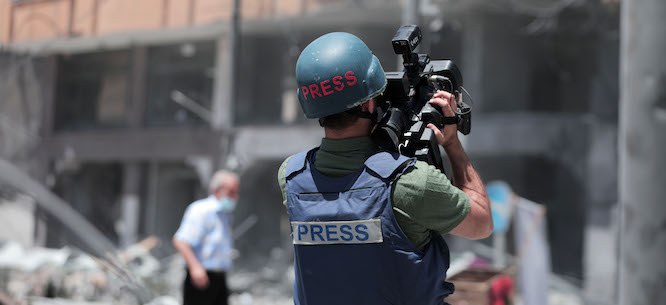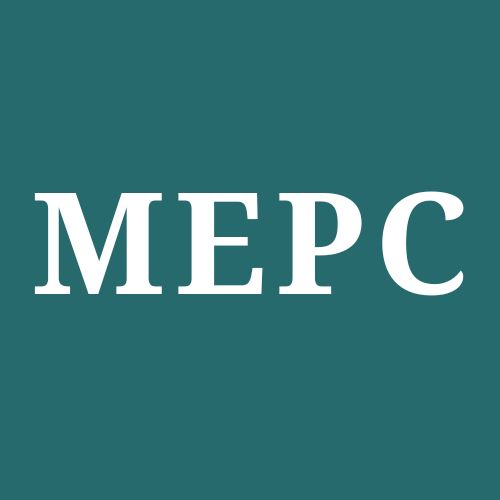Event Information
The Middle East Policy Council held its 115th Capitol Hill Conference on Thursday, January 25, 2024, on the topic “Information & War: A Case Study in Gaza.” The event took place in the Capitol Visitors Center of the U.S. Congress.
Ms. Bassima Alghussein (Executive Director, Middle East Policy Council) introduced the event, and Ambassador Gina Abercrombie-Winstanley (President, Middle East Policy Council; former U.S. Ambassador to Malta) was the moderator. The panelists were: Mr. Andrew Steinfeld (Former diplomat, U.S. Department of State); Mr. Dan Arbell (Former diplomat, Israeli Ministry of Foreign Affairs); Ms. Nadia Bilbassy-Charters (Bureau Chief, Al Arabiya, Washington); and Dr. Jamal Nusseibeh (Non-Resident Scholar, Middle East Policy Council).
Mr. Andrew Steinfeld opened the discussion by describing his relationship with the press, which he identified as useful and symbiotic, throughout his diplomatic career, and noted that press access to field information in warzones often trumps that of foreign service officers. When discussing information in the context of the war in Afghanistan, Mr. Steinfeld assessed that military voices were listened to – by Congress, the press, and in general – more than those of civilians, a dynamic that led to a skewed view of how American and NATO were faring in the conflict. Mr. Steinfeld outlined the power of the media in shaping the information environment surrounding the ongoing Gaza war, in part because individuals can become siloed in the coverage they receive.
Mr. Dan Arbell discussed Israel’s information policy, commonly known as “hasbara,” (the Hebrew word meaning “to explain”) sharing that these reactive, tailored policy explanations face sophisticated information campaigns by Israel’s opponents. He specified that negative views towards the Israeli-Palestinian conflict are not an information issue that a good argument can defeat, but rather, a living reality that presents a challenge, and at times a threat, to Israel’s identity and future. Mr. Arbell analyzed that on October 7, a second front in the war opened online, a global information conflict that, more than killing thousands of Israelis, could reach Israelis worldwide. In response, Israel practically privatized hasbara, investing millions of dollars in private companies to distribute its messages, buy ads on social media, and fight against misinformation. Mr. Arbell discussed the role of social media shaping public opinion and diplomatic and military decisions, and he emphasized that online debates are becoming central to how modern conflicts are fought and won.
Ms. Nadia Bilbassy-Charters urged that we do not abandon our commitment to international law and all conventions authored and authorized by the United Nations. Amid Gaza war coverage, she shared that, in general, Israel has the upper hand on the narrative in the U.S. due to negative depictions of Palestinians and censorship against Palestinian perspectives. Ms. Bilbassy-Charters clarified that there is a lack of news from Gaza because Israel does not allow independent journalists there and, of the Palestinian journalists permitted, over 100 have been killed. While Western journalists can enter Gaza with the IDF, this system, when applied in Gaza or other war zones, limits the sites that reporters have access to. While acknowledging Israel’s legitimate right to combat Hamas and defend its citizens, Ms. Bilbassy-Charters cited differences in Western reactions to Russian and Israeli military operations, despite several similarities between the wars. She advocated for investigations when information on the war is unproven or unclear, and for corresponding accountability.
Dr. Jamal Nusseibeh demonstrated that, without a single international journalist in Gaza, American and European media outlets are severely restricted in their access to information. He cited several specific examples of Israel targeting Palestinian journalists, their families, and their staff, a violation of international law. Dr. Nusseibeh explained that the Israeli censor office supervises and controls all journalists in Israel, an oversight measure that may play a role in the almost complete absence of coverage on Gaza’s civilian death toll in Israeli domestic media. The variations in coverage, according to Dr. Nusseibeh, hinder the formulation of informed opinions and the public’s ability to exercise its democratic choice, particularly in Israel. He concluded by advocating for the safeguarding of civilians and U.S. recognition of a Palestinian state.

